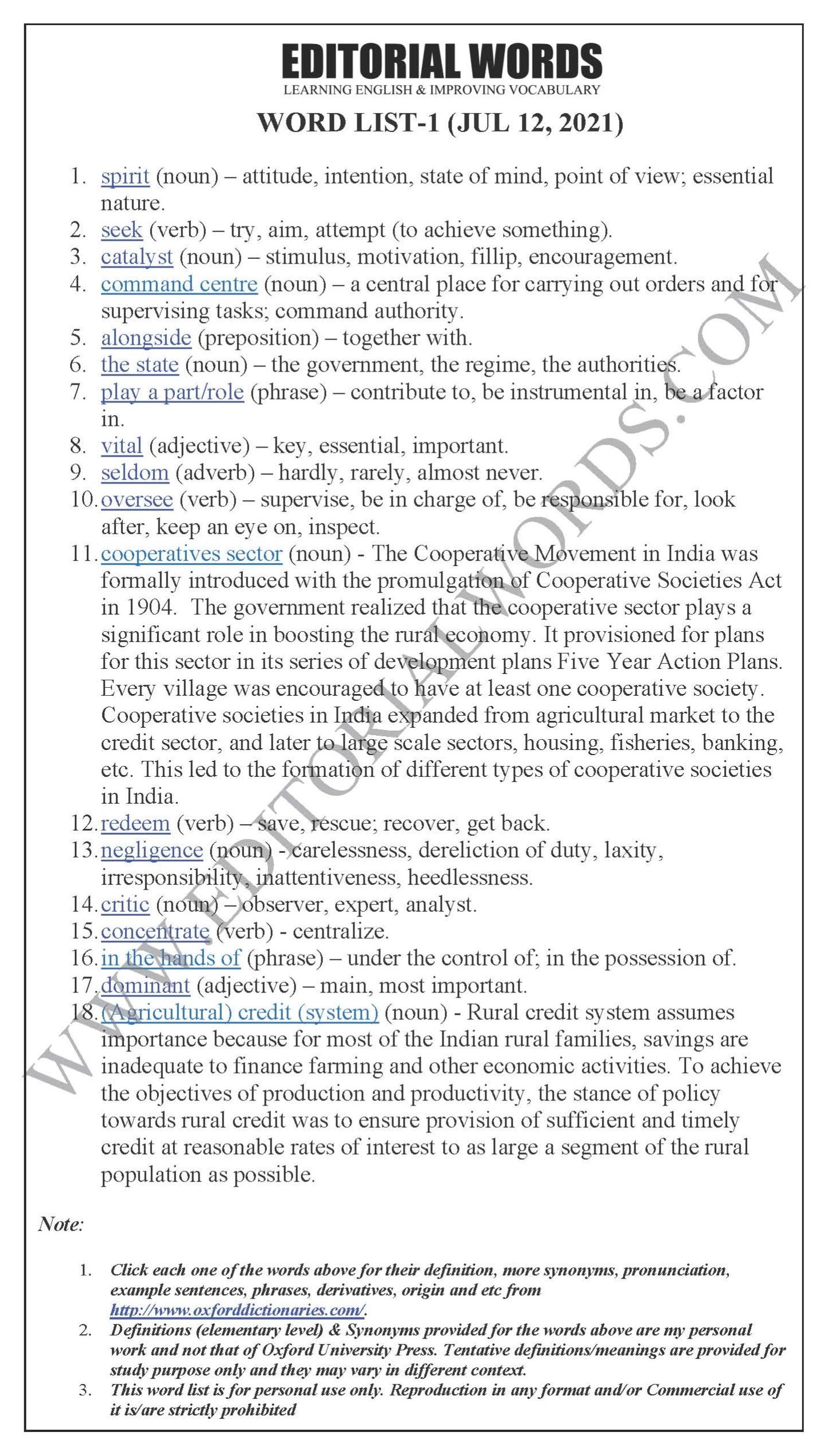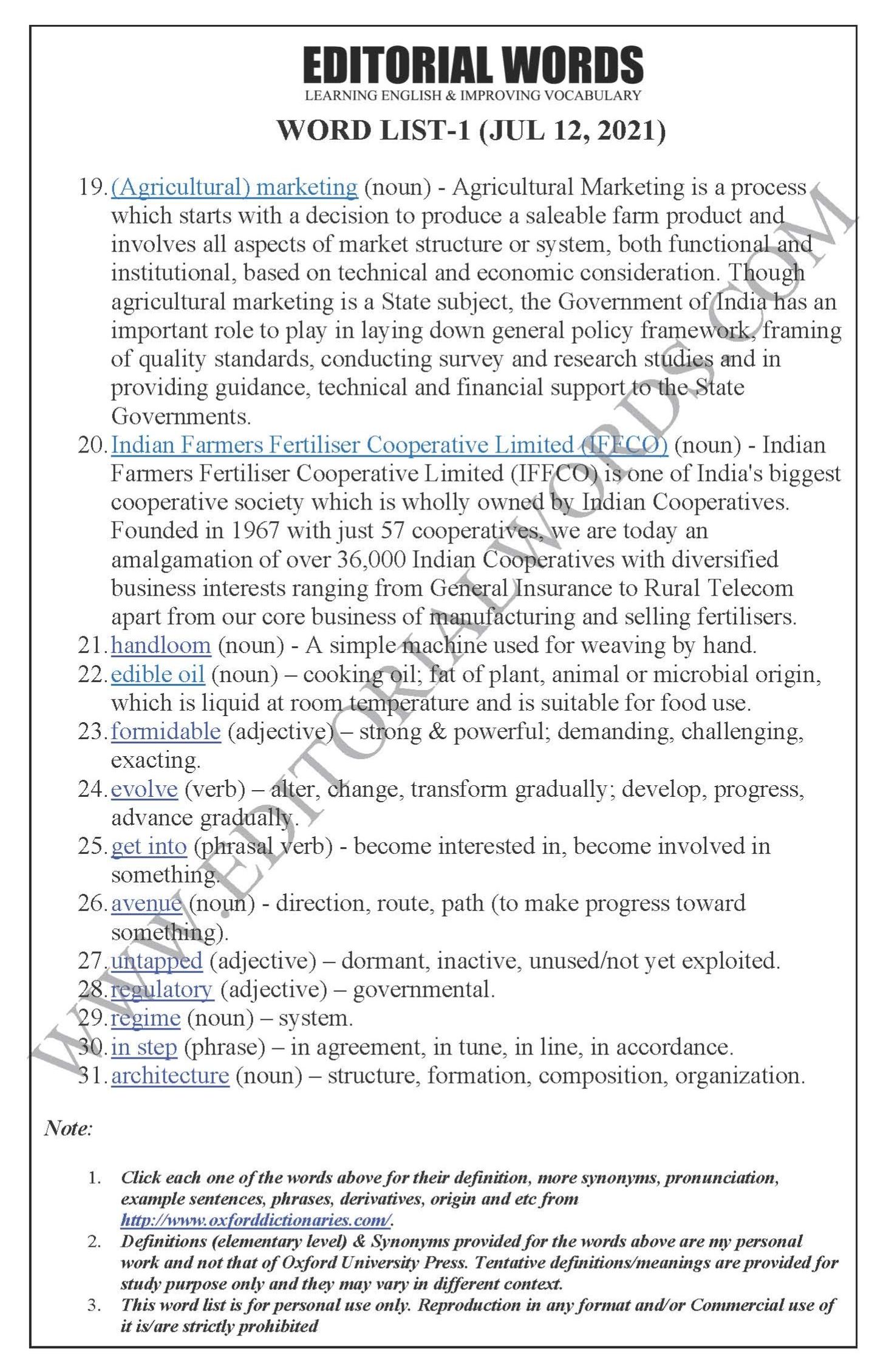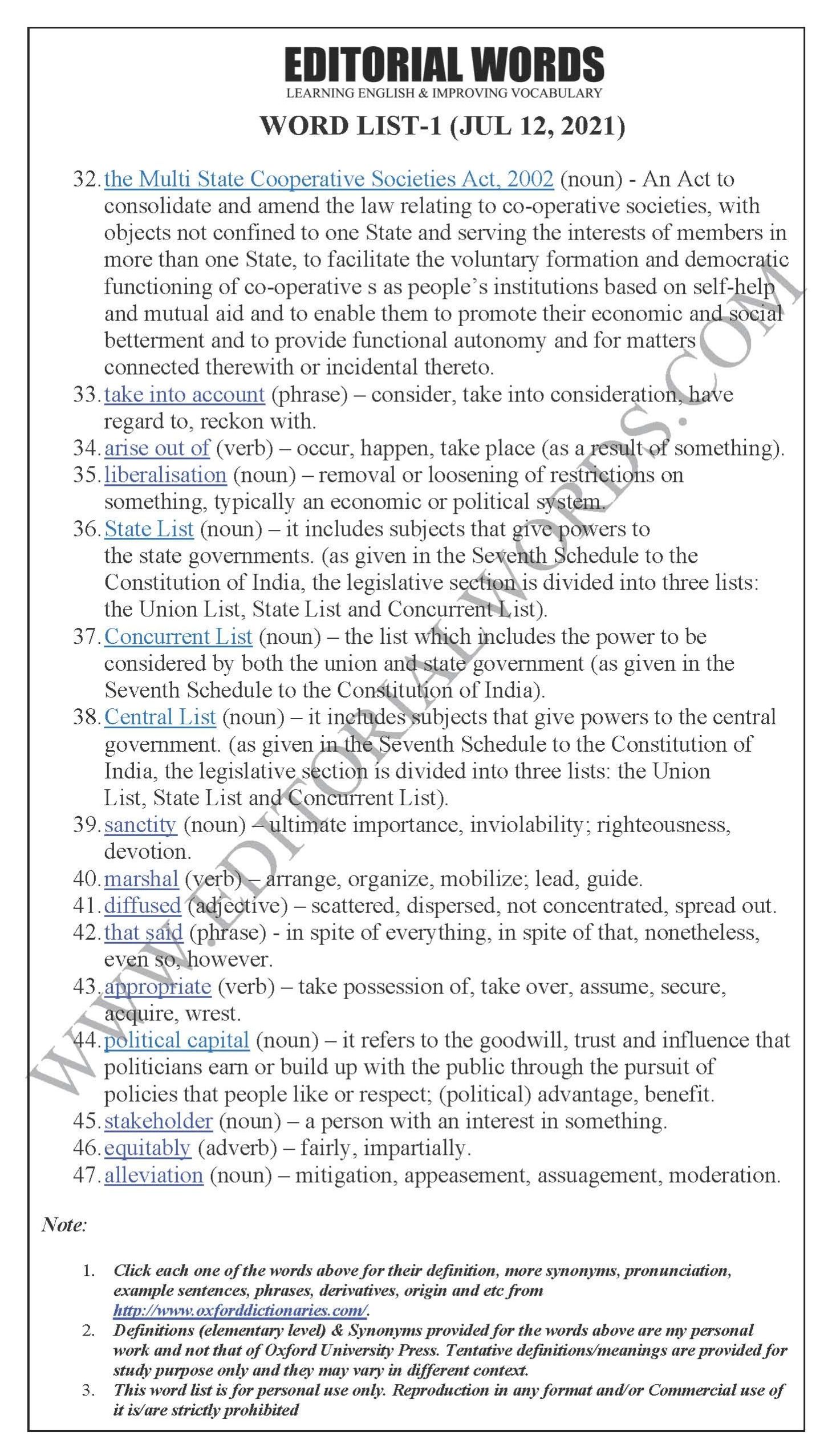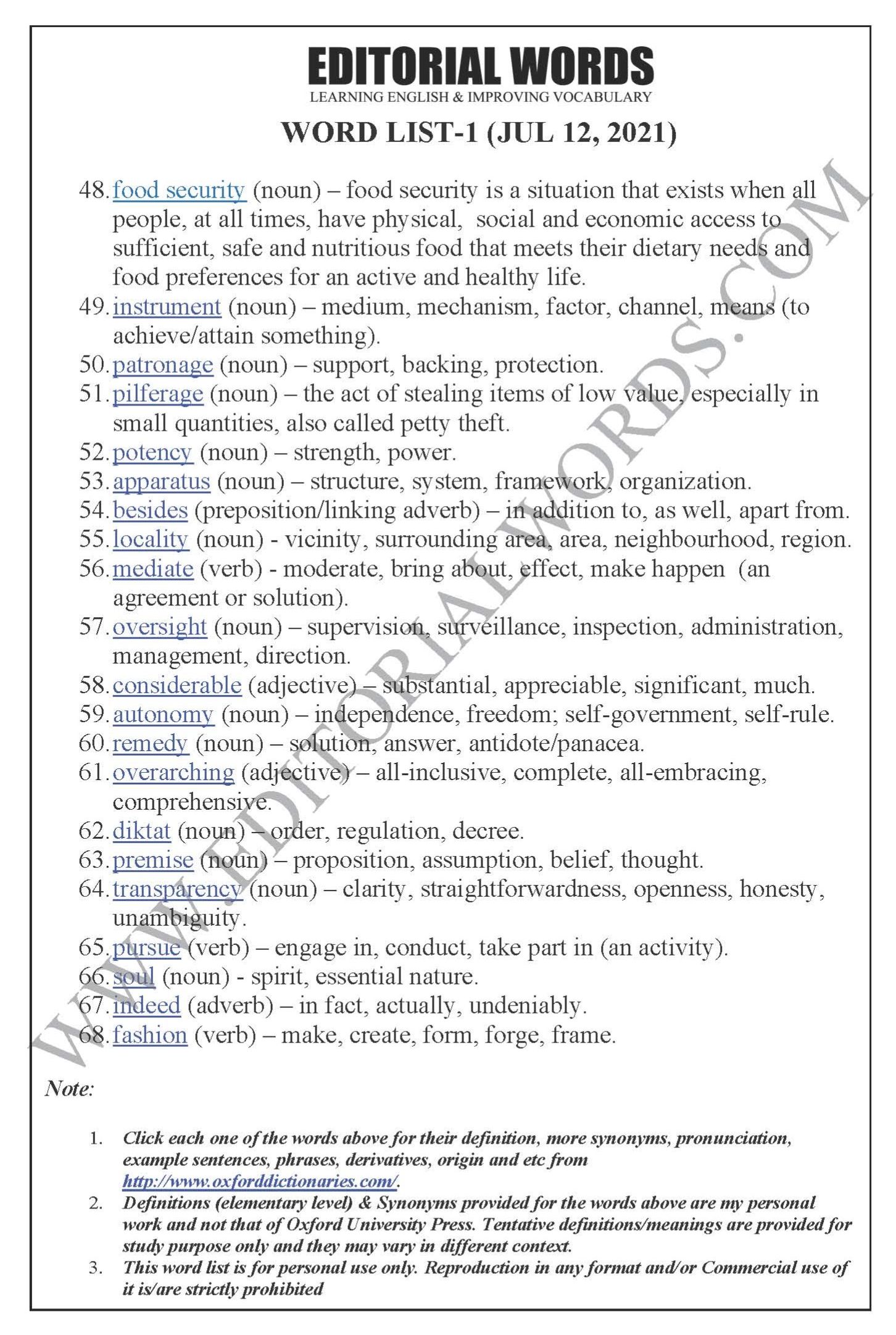The Hindu Editorial (Cooperative spirit) – Jul 12, 2021
Alongside the state and the market, cooperatives play a vital role in the country’s development but are seldom the focus of policy planning. For further reading, visit “The Hindu”. Below is today’s word list-1 for The Hindu Editorial (Cooperative spirit) – Jul 12, 2021.
To read this article, click here.
This preview is provided here with permission.
Courtesy: The Hindu
The Hindu Editorial (Cooperative spirit) – Jul 12, 2021:
- spirit (noun) – attitude, intention, state of mind, point of view; essential nature.
- seek (verb) – try, aim, attempt (to achieve something).
- catalyst (noun) – stimulus, motivation, fillip, encouragement.
- command centre (noun) – a central place for carrying out orders and for supervising tasks; command authority.
- alongside (preposition) – together with.
- the state (noun) – the government, the regime, the authorities.
- play a part/role (phrase) – contribute to, be instrumental in, be a factor in.
- vital (adjective) – key, essential, important.
- seldom (adverb) – hardly, rarely, almost never.
- oversee (verb) – supervise, be in charge of, be responsible for, look after, keep an eye on, inspect.
- cooperatives sector (noun) – The Cooperative Movement in India was formally introduced with the promulgation
of Cooperative Societies Act in 1904. The government realized that the cooperative sector plays a significant role in boosting the rural economy. It provisioned for plans for this sector in its series of development plans Five Year Action Plans. Every village was encouraged to have at least one cooperative society. Cooperative societies in India expanded from agricultural market to the credit sector, and later to large scale sectors, housing, fisheries, banking, etc. This led to the formation of different types of cooperative societies in India. - redeem (verb) – save, rescue; recover, get back.
- negligence (noun) – carelessness, dereliction of duty, laxity, irresponsibility, inattentiveness, heedlessness.
- critic (noun) – observer, expert, analyst.
- concentrate (verb) – centralize.
- in the hands of (phrase) – under the control of; in the possession of.
- dominant (adjective) – main, most important.
- (Agricultural) credit (system) (noun) – Rural credit system assumes importance because for most of the Indian rural families, savings are inadequate to finance farming and other economic activities. To achieve the objectives of production and productivity, the stance of policy towards rural credit was to ensure provision of sufficient and timely credit at reasonable rates of interest to as large a segment of the rural population as possible.
- (Agricultural) marketing (noun) – Agricultural Marketing is a process which starts with a decision to produce a saleable farm product and involves all aspects of market structure or system, both functional and institutional, based on technical and economic consideration. Though agricultural marketing is a State subject, the Government of India has an important role to play in laying down general policy framework, framing of quality standards, conducting survey and research studies and in providing guidance, technical and financial support to the State Governments.
- Indian Farmers Fertiliser Cooperative Limited (IFFCO) (noun) – Indian Farmers Fertiliser Cooperative Limited (IFFCO) is one of India’s biggest cooperative society which is wholly owned by Indian Cooperatives. Founded in 1967 with just 57 cooperatives, we are today an amalgamation of over 36,000 Indian Cooperatives with diversified business interests ranging from General Insurance to Rural Telecom apart from our core business of manufacturing and selling fertilisers.
- handloom (noun) – A simple machine used for weaving by hand.
- edible oil (noun) – cooking oil; fat of plant, animal or microbial origin, which is liquid at room temperature and is suitable for food use.
- formidable (adjective) – strong & powerful; demanding, challenging, exacting.
- evolve (verb) – alter, change, transform gradually; develop, progress, advance gradually.
- get into (phrasal verb) – become interested in, become involved in something.
- avenue (noun) – direction, route, path (to make progress toward something).
- untapped (adjective) – dormant, inactive, unused/not yet exploited.
- regulatory (adjective) – governmental.
- regime (noun) – system.
- in step (phrase) – in agreement, in tune, in line, in accordance.
- architecture (noun) – structure, formation, composition, organization.
- the Multi State Cooperative Societies Act, 2002 (noun) – An Act to consolidate and amend the law relating to co-operative societies, with objects not confined to one State and serving the interests of members in more than one State, to facilitate the voluntary formation and democratic functioning of co-operative s as people’s institutions based on self-help and mutual aid and to enable them to promote their economic and social betterment and to provide functional autonomy and for matters connected therewith or incidental thereto.
- take into account (phrase) – consider, take into consideration, have regard to, reckon with.
- arise out of (verb) – occur, happen, take place (as a result of something).
- liberalisation (noun) – removal or loosening of restrictions on something, typically an economic or political system.
- State List (noun) – it includes subjects that give powers to the state governments. (as given in the Seventh Schedule to the Constitution of India, the legislative section is divided into three lists: the Union List, State List and Concurrent List).
- Concurrent List (noun) – the list which includes the power to be considered by both the union and state government (as given in the Seventh Schedule to the Constitution of India).
- Central List (noun) – it includes subjects that give powers to the central government. (as given in the Seventh Schedule to the Constitution of India, the legislative section is divided into three lists: the Union List, State List and Concurrent List).
- sanctity (noun) – ultimate importance, inviolability; righteousness, devotion.
- marshal (verb) – arrange, organize, mobilize; lead, guide.
- diffused (adjective) – scattered, dispersed, not concentrated, spread out.
- that said (phrase) – in spite of everything, in spite of that, nonetheless, even so, however.
- appropriate (verb) – take possession of, take over, assume, secure, acquire, wrest.
- political capital (noun) – it refers to the goodwill, trust and influence that politicians earn or build up with the public through the pursuit of policies that people like or respect; (political) advantage, benefit.
- stakeholder (noun) – a person with an interest in something.
- equitably (adverb) – fairly, impartially.
- alleviation (noun) – mitigation, appeasement, assuagement, moderation.
- food security (noun) – food security is a situation that exists when all people, at all times, have physical, social and economic access to sufficient, safe and nutritious food that meets their dietary needs and food preferences for an active and healthy life.
- instrument (noun) – medium, mechanism, factor, channel, means (to achieve/attain something).
- patronage (noun) – support, backing, protection.
- pilferage (noun) – the act of stealing items of low value, especially in small quantities, also called petty theft.
- potency (noun) – strength, power.
- apparatus (noun) – structure, system, framework, organization.
- besides (preposition/linking adverb) – in addition to, as well, apart from.
- locality (noun) – vicinity, surrounding area, area, neighbourhood, region.
- mediate (verb) – moderate, bring about, effect, make happen (an agreement or solution).
- oversight (noun) – supervision, surveillance, inspection, administration, management, direction.
- considerable (adjective) – substantial, appreciable, significant, much.
- autonomy (noun) – independence, freedom; self-government, self-rule.
- remedy (noun) – solution, answer, antidote/panacea.
- overarching (adjective) – all-inclusive, complete, all-embracing, comprehensive.
- diktat (noun) – order, regulation, decree.
- premise (noun) – proposition, assumption, belief, thought.
- transparency (noun) – clarity, straightforwardness, openness, honesty, unambiguity.
- pursue (verb) – engage in, conduct, take part in (an activity).
- soul (noun) – spirit, essential nature.
- indeed (adverb) – in fact, actually, undeniably.
- fashion (verb) – make, create, form, forge, frame.
Note:
1. Click each one of the words above for their definition, more synonyms, pronunciation, example sentences, phrases, derivatives, origin and etc from http://www.oxforddictionaries.com/.
2. Definitions (elementary level) & Synonyms provided for the words above are my personal work and not that of Oxford University Press. Tentative definitions/meanings are provided for study purpose only and they may vary in a different context.
3. This word list is for personal use only. Reproduction in any format and/or Commercial use of it is/are strictly prohibited.
The Hindu Editorial (Cooperative spirit) – Jul 12, 2021:




“Phrasal Verbs” We Learnt Last Week
“Idioms & Phrases” We Learnt Last Week
“Important Definitions” We Learnt Last Week
Recent Word Lists For The Hindu Editorial Articles

Be the first to comment